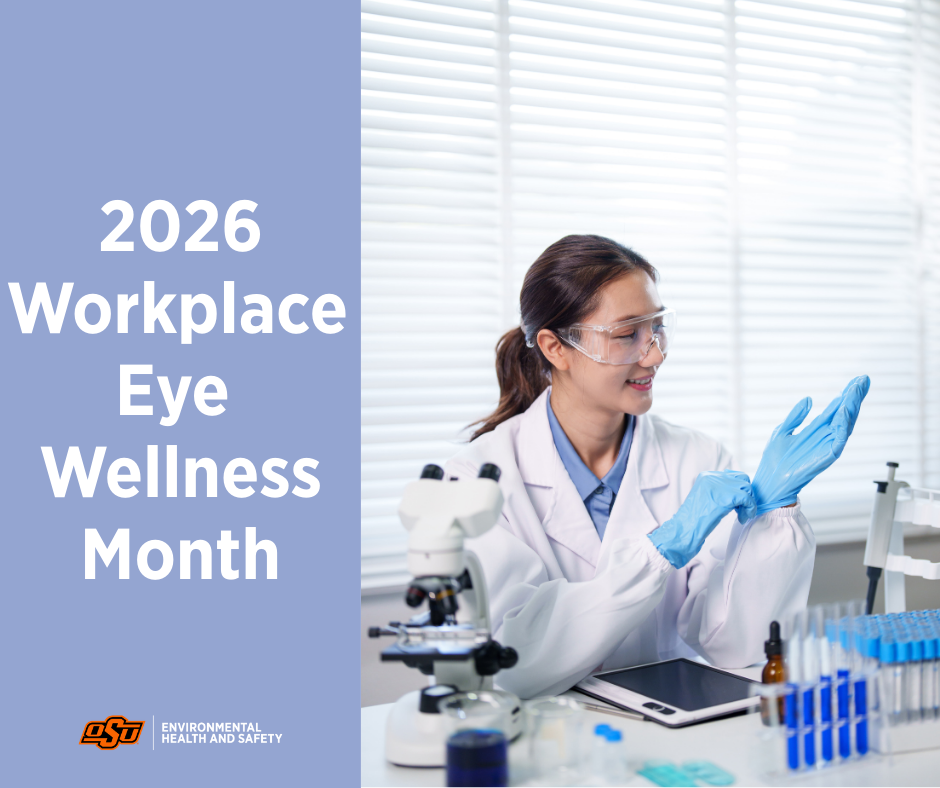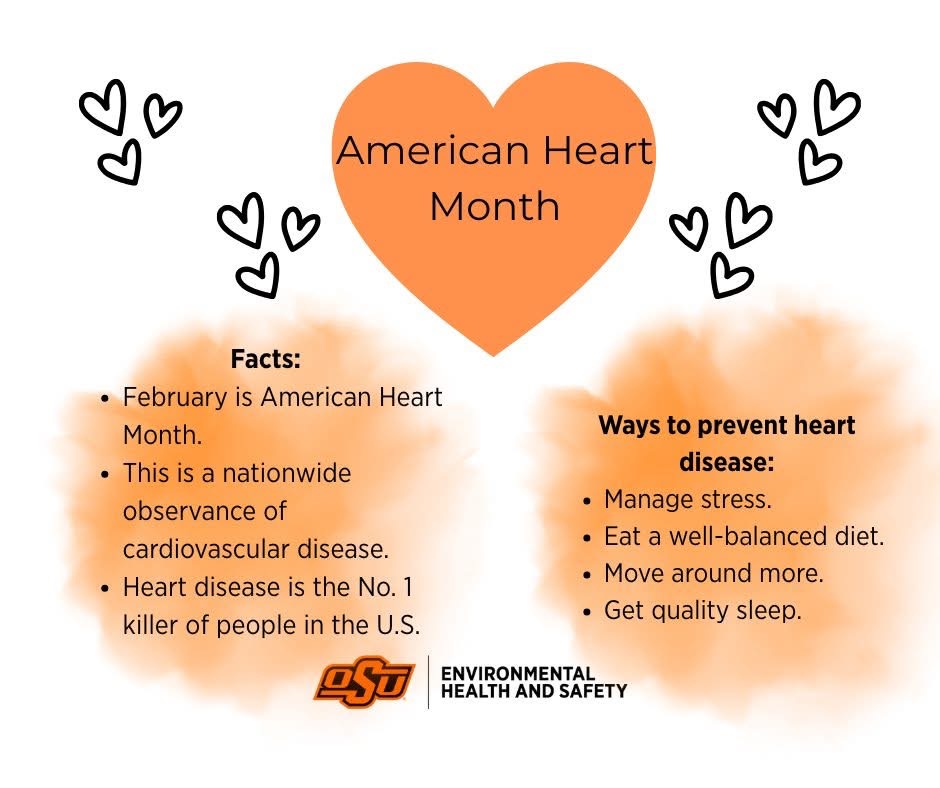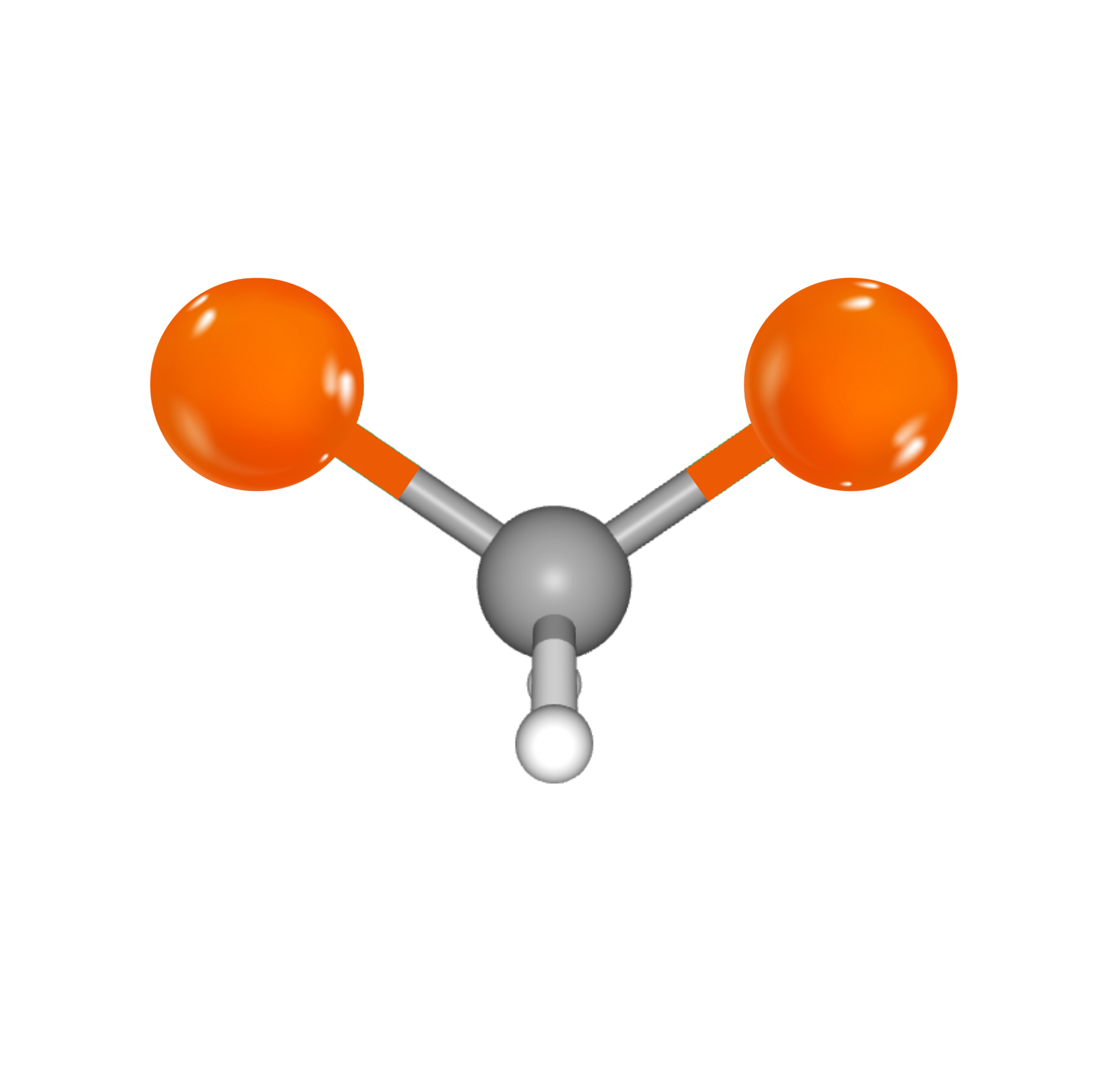Environmental health and safety
Workplace Eye Wellness Month
Nearly 20,000 workplace eye injuries happen each year in the U.S., and many are preventable. From flying debris and chemical splashes to welding radiation and screen strain, eye hazards exist in many work environments.
Workplace Eye Wellness Month is a reminder to wear proper protection, follow safety protocols, and stay aware of risks. Protect your vision, it only takes a moment.

American Heart Month
February is 💖 month! In honor of American Heart Month, let’s celebrate healthy habits, stronger hearts, and the power of small daily choices. Move more, stress less, eat well, and show your heart some love.

Service. Quality. Knowledge.
The OSU Environmental Health and Safety Department consists of four teams - Environmental Compliance, Fire and Life Safety, Laboratory Safety, and Occupational and Construction Safety. Our primary goal is to promote health, safety, and environmental protection by providing exemplary programs and services in support of the university's mission.
Student Employee Feature
Allison Carlisle
Allison is a student employee for EHS, majoring in Marketing and is a member of Delta Delta Delta. If she could have any superpower, she would choose flying for the sense of freedom it brings. A proud early bird, Allison enjoys starting her mornings calmly and staying organized throughout the day. We’re lucky to have you on the team and appreciate everything you do, Allison!
Laboratory Manager Spotlight
Blaine Bennett
Blaine is the Necropsy and Receiving Laboratory Manager for the Oklahoma Animal Disease Diagnostic Laboratory (OADDL) at OSU where he has served for over a year and a half in his first laboratory manager role. Inspired by a lifelong interest in veterinary medicine and animal health, his work supports livestock producers, veterinarians, and animal owners across Oklahoma while helping promote a positive experience for those working at OSU. Working in a highly dynamic necropsy environment, Blaine prioritizes safety through extensive training, accessible PPE, and strong collaboration with EHS to ensure his laboratory remains a safe and effective space for all. EHS appreciates your dedication to safety and excellence, Blaine!
Quarterly Newsletters Newsletter Archive
Monthly Training
Respiratory Protection
- Class will take place the first Tuesday of each month.
- Next opportunity: March 3, 8:30 - 9:30 a.m.
- Facilities Management North building, Room 101C
Bloodborne Pathogen
- Class will take place the second Tuesday of each month.
- Next opportunity: March 10, 9-9:45 a.m. or 2-2:45 p.m.
- EHS Conference Room, University Health Services 003
Employee Training
- Class will take place the third Thursday of each month.
- Next opportunity: March 19, 9:30-11:30 a.m.
- EHS Conference Room, University Health Services 003
Fire Safety Training
- Class will take place the second Friday of each month.
- Next opportunity: March 13, 9-10 a.m.
- EHS Conference Room, University Health Services 003
Laboratory Safety and Hazardous Waste Training
- Class will take place the fourth Tuesday of each month.
- Next opportunity: February 24, 8:30-10:30 a.m.
- EHS Conference Room, University Health Services 003
Additional Training Opportunities
OSHA 300A Logs
Record Keeping and Reporting Requirements
The Occupational Safety and Health Administration (OSHA) requires employers with more than 10 employees to keep a record of serious work-related injuries and illnesses. The records must be maintained at the worksite for at least five years.
New EPA Regulations on Methylene Chloride

Fact Sheets and Safety Info
The EPA has finalized a rule regarding methylene chloride, also known as dichloromethane (DCM) under the Toxic Substance Control Act (TSCA). Learn more via the links below.
Timeline of Changes
As a research institution, laboratories on campus are allowed to continue some use of DCM, contingent upon new requirements and compliance with the timeline of changes.
- Initial monitoring by 05/05/2025 with periodic monitoring depending on results
- Ensure new exposure limits are met by 08/2025 and provide PPE for affected employees
- Development of an exposure control plan or Workplace Chemical Protection Program by 10/30/2025
Ensuring Compliance
If you are a PI on campus who uses DCM also known as methylene chloride in your lab spaces, please contact us to conduct air monitoring and an assessment of your current chemical hygiene plan.
Forms and Permits
New Forms

Our department is moving to a new system for submitting permits! CampusOptics is a platform specifically designed to assist with environmental, health, and safety-related program implementation and monitoring on college campuses. Login to your OSU CampusOptics account here!
We hope this new system will streamline our processes, but in the meantime, please contact us with any questions or issues.
Safety Documents
Fact Sheets
Access useful fact sheets and brief safety information. Topics include:
- Accident Investigation
- Ergonomics
- Laboratory Safety
- Slips, Trips, and Falls
Manuals
Access safety information and guidance documents. Topics include:
- Addressable Fire Alarm Systems
- Chemical Hygiene Plan
- Machine Guarding Checklist
- Respiratory Protection Program Manual
Reporting Safety Concerns Call EHS with any concerns regarding the safety of campus personnel or facilities.
Such concerns could include unsafe work environments or classrooms, unsafe work practices, perceived poor indoor air quality, and more.
